 Gambling debts are something that many people don’t think they’ll fall victim to. The truth is that anyone could potentially be at risk of falling into such a state, which is why it is always good to make sure you’re not gambling with more than you can afford to lose.
Gambling debts are something that many people don’t think they’ll fall victim to. The truth is that anyone could potentially be at risk of falling into such a state, which is why it is always good to make sure you’re not gambling with more than you can afford to lose.
That being said, some people do end up suffering from gambling debts, and these tend to build up over time, becoming quite large in some instances. The question is are these gambling debts something that can legally be enforced upon a person?
Well, in general, it depends upon the situation specific to the player. If you’re gambling at a licensed and regulated operator within the United Kingdom, then the answer is pretty much a positive one. Yes, the gambling debts that you may rack up are enforceable by law. However, if you’re registered and gambling at an offshore or unlicensed site, then perhaps things aren’t quite so black and white.
There is more to it than simply being an enforceable debt or not though, and this is what we are aiming to unveil to you here today. Let’s take a look at the legal enforceability of gambling debts in the United Kingdom.
A Look Back in Gambling Debt History
Wild West
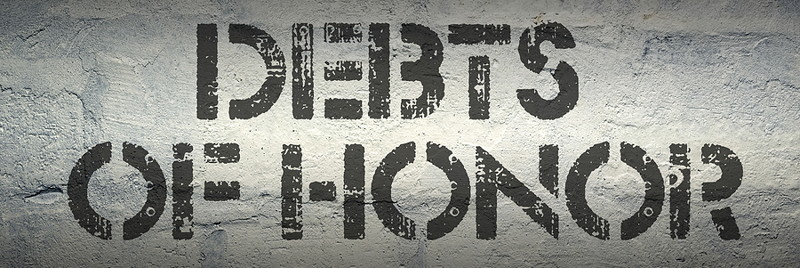
If you were to go back to pre-2007 gambling in the UK, then it would be the case that any debts incurred by a person gambling were not enforceable by law. Therefore, at that time, debts of this nature were not something that a person could be forced to pay.
It became almost like a wild west show, where gamblers were getting away with sinking into debt from betting too much, especially via credit card. Yet there was no legislation that said these debts were able to be enforced by law, so they could not be held to account for them.
Licensed Gambling With Enforceable Debt
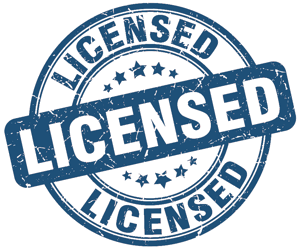 Enter the Gambling Act 2005, which officially came into effect in September of 2007. Section 335 of that Act provides the legislation that a contract relating to gambling shall not prevent its enforcement. In other words, any gambling debt that a player may end up incurring can legally be enforced, as long as it relates to gambling that took place under the current UK laws. Gambling in the country is lawful if it has been permitted by the Gambling Act 2005 or the National Lottery Act of 1993.
Enter the Gambling Act 2005, which officially came into effect in September of 2007. Section 335 of that Act provides the legislation that a contract relating to gambling shall not prevent its enforcement. In other words, any gambling debt that a player may end up incurring can legally be enforced, as long as it relates to gambling that took place under the current UK laws. Gambling in the country is lawful if it has been permitted by the Gambling Act 2005 or the National Lottery Act of 1993.
In this respect, any gambling debts that have arisen from partaking in betting and gambling at licensed casinos or betting shops, can legally be deducted. However, debts that have cropped up in relation to gambling that is not legal under the relevant laws cannot be enforced. Any debts that a gambler had built up prior to September 2007 were unenforceable, so could not be considered as valid deductions.
Naturally, because of the unenforceability of these debts, issue was taken by operators to players who had built up such penalties and could not be forced to pay them. And this was one of the various reasons why the Gambling Act 2005 was conjured up and brought into law. Regulation was required and regulation is exactly what the industry got from this.
Credit Banned
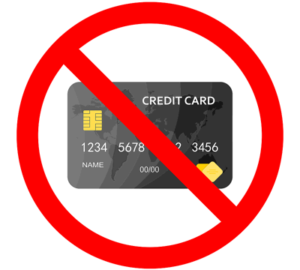 Credit card debts that were amassed from betting after the Gambling Act 2005 was introduced could be enforced, although the government was urged to take action on such cards being used at casinos altogether.
Credit card debts that were amassed from betting after the Gambling Act 2005 was introduced could be enforced, although the government was urged to take action on such cards being used at casinos altogether.
It was recognised that credit card gambling was having a considerable effect on the number of people suffering from gambling problems. Therefore, in April of 2020, it became illegal for licensed casinos to offer players in the UK the chance to deposit via a credit card. This was taken as a measure to try and combat the amount of problem gambling issues that were occurring in the country.
It is also now not possible to gamble with any credit, such as loans. Operators are obliged to check source of funds now for larger transactions too and this reduces the use of credit for gambling directly. As a result of that judgement, gambling debts are not quite as commonplace today.
Yet it doesn’t mean that the problem of gambling debts has been solved altogether. Of course, some people still use credit funds to gamble or indeed gamble with funds that should be used to repay another debt, thereby increasing the overall debt indirectly.
Paying Gambling Debts
 Most of us know that gambling can be addictive and it is therefore possible to accrue debts from such activity. Effectively if you have reached a point where you are going into debt to gamble then you have a gambling problem but realising that at the time is not always easy.
Most of us know that gambling can be addictive and it is therefore possible to accrue debts from such activity. Effectively if you have reached a point where you are going into debt to gamble then you have a gambling problem but realising that at the time is not always easy.
Yet despite knowing this, some people fall into problem gambling and can go into debt. But once you have a gambling debt, how do you go about paying it off? After all, many players with a problem will continue gambling so much that they have no funds left over to pay them off. This creates a vicious cycle where money is required to handle the debts, but none is available to the player to do so.
While originally these debts were considered to be a debt of honour in the UK, they are no longer looked at in such a way. And the laws officially introduced in 2007 have led to some people getting into serious financial problems. Of course, the first course of action for anyone who has ended up in this position is to get help for your gambling problem itself. This will set you on the course towards avoiding gambling participation altogether.
Once the gambling issue itself is being treated, then it will be a lot easier to sort out making debt payments. While that can be a daunting prospect, gambling arrears are no different to any other kind of accumulated debt overall. Several options exist for a player to utilise in order to come to a final solution. Some debt support companies suggest doing any or all of the following things to get yourself organised with repaying debts:
List Everyone You Owe
This point really only stands if you have borrowed money from multiple businesses/people. You need to know how much you owe to each one of them, and if you get help from a professional company with this, then they can usually figure out every creditor you have borrowed from and how much is owed via a standard credit check.
Make a Plan for Budgeting Your Funds
Ideally, this is something that everyone who gambles should have in place from the start. However, it’s never too late to start with budgeting your money, because at least you know when you’re receiving income, making payments and what you have left over afterwards.
You can then set aside a portion of it for repaying the gambling debts, which you know won’t eat into the general cost of everyday living.
Seek Out Professional Advice and Help
It is often difficult for humans to admit that they need help with anything, but when it comes to debts, it is vital to know the best route to take towards tackling it. Therefore, if you don’t think you have what it takes to manage such debts alone, then there are various companies available that will help you sort it out.
Advice will usually be tailored to your specific situation, and it is 100% confidential as well. This way, a proper plan can be worked out for you to repay the money you have borrowed.
Considering Bankruptcy from Gambling Debts
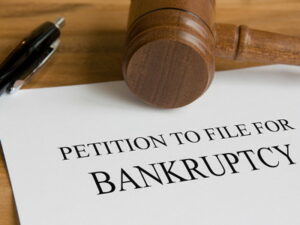 Nobody really likes to think of themselves going bankrupt at any point in life. Yet it has happened to many people over the years, including some sportsmen and other celebrities.
Nobody really likes to think of themselves going bankrupt at any point in life. Yet it has happened to many people over the years, including some sportsmen and other celebrities.
Footballer Danny Guthrie, who has played for teams like Newcastle United, Fulham and Walsall in his career, ended up declaring bankruptcy in June of 2022 after it emerged he had a £120,000 gambling debt.
In May of 2019, he borrowed a total of £75,000 from a friend to pay some expenses, promising to repay the loan after selling a house. The sale of that house occurred in 2022, with Guthrie securing £160,000 from it. He then withdrew funds in cash from his personal bank account to pay off some previously accrued gambling debts of more than £120,000.
Yet after a series of Court actions, he had to file for bankruptcy due to his unpaid debts actually reaching £195,000. This came about because he chose to pay off his gambling debts first, rather than repay other creditors.
Bankruptcy is something that can be utilised as a sort of last resort route, though. If you are really struggling to repay gambling debts to creditors and you don’t foresee a change in circumstances in the future, then you can turn to this option.
It is vital to keep in mind that if gambling is identified as being a contributing factor to your bankruptcy and the Official Receiver considers it to be justified, then an application for a Bankruptcy Restriction Order could be filed. This could extend the bankruptcy restrictions against you, and this could last anywhere between two and 15 years.
Individual Voluntary Arrangements (IVAs)
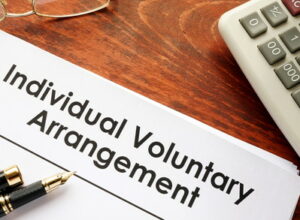 Bankruptcy is not the only option that you can go for in this circumstance. Instead, you can choose to solve the debt issue via an Individual Voluntary Arrangement or IVA. This may be something that many people haven’t heard of or considered, but they can provide a good alternative solution to take advantage of if you’re not able to afford the worked out contractual repayments, but you do want to be able to pay off as much as you are able to reasonably afford.
Bankruptcy is not the only option that you can go for in this circumstance. Instead, you can choose to solve the debt issue via an Individual Voluntary Arrangement or IVA. This may be something that many people haven’t heard of or considered, but they can provide a good alternative solution to take advantage of if you’re not able to afford the worked out contractual repayments, but you do want to be able to pay off as much as you are able to reasonably afford.
If you choose this option and you are approved for it, then creditors will go ahead and freeze the interest and charges on your debts. This ensures that the amount of debt you have to repay does not increase due to these. An IVA is also able to protect things like your home or your car from being repossessed should you not be able to make repayments via other methods.
Part of your debts may be written off via an IVA as well. Yet this all depends upon whether or not the creditors agree to it in the first place, as well as the terms associated with it.
